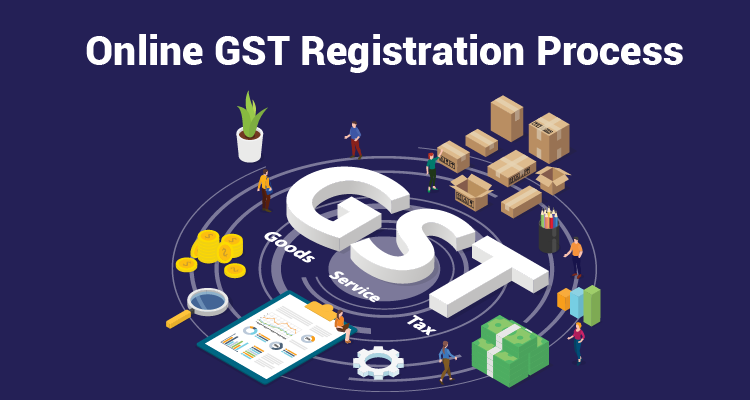Maximizing Your Tax Obligation Benefits: Just How GST Enrollment Can Help Your Company Save Money and Boost Financial Resources
Understanding the Essentials of GST Registration
To efficiently navigate the complicated realm of tax obligation benefits, a fundamental understanding of GST enrollment is important for businesses seeking to enhance their financial approaches. Product and Services Tax (GST) is an intake tax obligation that is levied on the supply of items and services in Singapore. Any kind of business with a yearly taxable turnover going beyond S$ 1 million is required to register for GST. However, voluntary enrollment is also permitted for companies that do not meet this threshold, as it permits them to claim input tax sustained on their acquisitions.

Discovering Tax Advantages of GST Enrollment
Beginning on an exploration of the tax benefits stemmed from GST registration introduces a myriad of benefits for organizations intending to optimize their economic approaches. One substantial advantage is input tax obligation credit history, where companies can claim credit scores for taxes paid on input costs throughout the production of goods or solutions. This aids in minimizing the overall tax obligation obligation and operating costs. Additionally, GST enrollment allows services to expand their market reach by marketing products across state boundaries without the inconvenience of numerous tax registrations. This simplification of the tax framework enhances organization efficiency and competition.

Leveraging Input Tax Credit Scores for Savings
Exploring the strategic utilization of Recommended Site input tax obligation credit history can bring about substantial price financial savings and enhanced economic performance for organizations signed up under GST. Input tax credit history (ITC) allows companies to offset the tax they have actually paid on inputs against the tax they are accountable to pay on results, therefore minimizing the general tax obligation responsibility. By leveraging ITC efficiently, businesses can decrease their functional expenses, boost money flow, and inevitably improve their lower line.
To maximize financial savings via input tax credit, businesses must make sure strict conformity with GST policies. This includes keeping precise documents of input taxes paid, integrating them with output taxes, and filing prompt returns. Correct documents and adherence to guidelines are essential to declaring and availing ITC flawlessly.
Additionally, businesses need to regularly evaluate their purchase refines to recognize opportunities for maximizing input tax obligation credit report (Best GST registration services in Singapore). This might involve sourcing inputs from GST-registered providers, confirming the eligibility of ITC cases, and staying informed regarding updates and modifications in GST regulations to profit from possible savings
Compliance Requirements for GST Registration
Structure a strong foundation for tax performance and economic monitoring, organizations starting GST registration need to stick to rigid conformity needs to make certain governing adherence and make best use of benefits. To start with, among the main compliance requirements for GST enrollment is the limit turn over limitation. Services with an annual turnover exceeding this prescribed limit are mandated to register for GST. In addition, timely and accurate filing of GST returns is important for compliance. These returns information the inward and outside materials made by the business, aiding in the estimation of tax obligation liability. Keeping appropriate financial documents and invoices in conformity with GST regulations is necessary. Any type of inconsistencies or non-compliance in record-keeping can lead to fines and legal effects. Routine audits and assessments by tax obligation authorities likewise create a part of conformity demands for services registered under GST. By carefully adhering to these conformity requirements, services can not just stay on the appropriate side of the legislation but likewise leverage the complete benefits of GST enrollment for financial savings and performance.
Strategic Financial Planning With GST
Executing calculated monetary planning strategies can dramatically improve the financial management of companies registered under GST, leading to enhanced tax benefits and boosted general efficiency. With GST enrollment, services can purposefully intend their financial resources by leveraging input tax debts, which enable them to offset tax obligations paid on inputs versus the tax obligations collected on outcomes.
Furthermore, strategic economic planning with GST entails forecasting capital, taking care of working resources efficiently, and lining up monetary decisions with tax obligation ramifications. By incorporating GST requirements right into click to read monetary preparation processes, organizations can guarantee conformity, minimize tax obligation risks, and maximize available tax advantages. Furthermore, companies can also check out financial investment opportunities, growth approaches, and cost-saving steps within the structure of GST policies to optimize economic growth and sustainability.
Final Thought
In verdict, GST registration offers businesses the a fantastic read possibility to optimize tax obligation benefits, save money, and improve their economic standing. By comprehending the fundamentals of GST enrollment, exploring tax obligation advantages, leveraging input tax obligation debt, and ensuring compliance with policies, organizations can strategically prepare their financial resources for long-lasting success. Carrying out GST enrollment can be a beneficial device in optimizing financial resources and enhancing overall company performance.
Product and Solutions Tax (GST) is an usage tax that is levied on the supply of goods and services in Singapore. Input tax obligation credit scores (ITC) enables companies to balance out the tax they have paid on inputs versus the tax obligation they are accountable to pay on results, therefore lowering the general tax liability. With GST registration, companies can tactically prepare their finances by leveraging input tax obligation credit scores, which enable them to counter tax obligations paid on inputs versus the tax obligations gathered on results. Best GST registration services in Singapore. By incorporating GST requirements into economic preparation processes, businesses can make sure compliance, lessen tax threats, and utilize on offered tax advantages. By recognizing the basics of GST enrollment, checking out tax obligation benefits, leveraging input tax obligation credit scores, and guaranteeing compliance with laws, companies can purposefully prepare their finances for long-lasting success
Comments on “Comprehensive Guide to the Best GST Registration Services in Singapore”